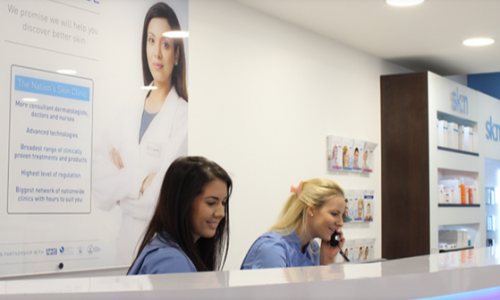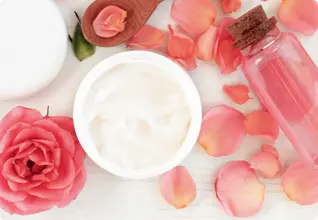Dermatologist advice on how to de-stress your skin

Feeling stressed and under pressure is unfortunately a common occurrence in most people’s lives. Being overwhelmed by stress can lead to problems with our skin and de-stressing your skin can be challenging.
Dr Daron Seukeran, Group Medical Director here at sk:n, explains why our skin is affected by stress and how we can try to de-stress our skin.
“In stressful situations, the body produces hormones such as adrenalin and cortisol, as well as proteins such as endorphins, insulin and ones that trigger inflammation. We know that this can have an impact on certain skin conditions.
“Psoriasis, rosacea and eczema are conditions known to become worse when individuals are going through stressful circumstances, which in turn can have a psychological and social confidence impact too. Although there is not a huge amount of clinical evidence, many people also feel that their acne gets worse during stressful times. Stress can also initiate oxidative stress which can damage cell and DNA, leading to premature ageing.
“Worsening skin conditions such as these can negatively influence how you feel about yourself and, the unrealistic social standards and pressures on social media, which can also contribute. This can lead to lack of self-confidence, and low self-esteem, social isolation and an increase in stress – creating a vicious cycle.”
Depending on your skin concern and the severity of the condition, there are a number of treatments that may help, including chemical peels, hydrafacial, IPL and anti-ageing injectables, or booking a dermatology consultation.
There are some surprising tips on how to keep stressful skin flare-ups at bay:
1. Eat more…. carrots
We have always been told that eating carrots is great for our vision, however, a lesser-known fact is the great benefits for our skin. Carrots provide a vital source of vitamin A, which is helpful for any healthy skin diet. They also contain biotin, vitamins K, C and B6, potassium and thiamine, all of which can help skin cells stay healthy. Many people find cooking is a great way to relax, so when you’re next in the kitchen, try whipping up a carrot-centric dish to double the benefits!
2. Try knitting
Knitting has been found to reduce depression and anxiety. Its repetitive movements can elicit a relaxation response, which is the body’s counterbalance to stress, when your heart rate and blood pressure fall, breathing slows, and levels of stress hormones drop. This can reduce inflammation of the skin, often triggered by stress. If picking up the needles isn’t for you, try other relaxation and mindfulness techniques, such as writing or painting, meditation or yoga. Talking about any pressures or stresses with family and friends can also help you to relax.
3. Get moving
Exercise can help to de-stress your skin by increasing levels of beta-endorphins, which fight the effects of cortisol. It can also boost energy levels and the immune system, in turn helping to improve eczema and psoriasis symptoms. However, always ensure you adapt your workout appropriately for your skin needs – for instance, if you are having a flare-up, opt for low-impact workouts and wear loose clothing to help reduce irritation to the skin.
Regular exercise also helps to delay the ageing process by increasing a particular organelle in our cells, called the mitochondria, which plays an important protective role in cellular ageing.
It also has positive effects on our skin’s thickness and elasticity – regardless of whether you’re an exercise novice or it has been part of your daily routine for years. To allow this natural process to fully work, it’s important to make sure that you cleanse your skin after your workout – simply wiping your face with a towel just won’t cut it. If you don’t, the dirt that has been released from your pores will still be sitting on the surface of the skin and will simply settle back into your pores again.
4. Choose makeup carefully
It’s tempting to use more cosmetics to cover up irritated skin and breakouts, especially if you are already feeling stressed out by these conditions. However, applying makeup can clog pores and further trigger inflammation. An alternative is choosing to wear mineral-based makeup, which essentially means its formula is made up of natural ingredients, however, this doesn’t mean it won’t irritate your skin, so when using any new products, test it on an inconspicuous area of your skin.
Going cold turkey isn’t always a realistic option for some people but be aware that sometimes makeup can make your skin worse due to an allergic or irritant effect. If you’re not confident, you don’t have to forego using makeup altogether, but perhaps applying a little less than you usually would, especially when it comes to foundation, as this is often the biggest culprit of clogging your pores if not removed correctly.
5. Light therapy
One way of treating acne or, rosacea or redness is through light therapy. This entirely natural skin treatment uses focused LED lights to help treat inflammation and other symptoms. Photodynamic Therapy is one option, as well as the detoxing and decongesting benefits of a hydrafacial routine. Low-intensity LED light therapy combined with Hydrafacial is often used to help improve the appearance of the skin and reduce the symptoms of certain skin conditions.
Red light
Red light therapy helps collagen production, reduce inflammation, and improve skin texture. This is beneficial for several skin concerns including acne, rosacea, sun damage and fine lines and wrinkles.
Blue light
Blue light therapy can target the bacteria that causes acne and can help improve the appearance of congested and oily skin.
6. Try distraction techniques
For some, a response to feeling anxious or stressed can lead to skin-picking disorder (also called dermatillomania or excoriation disorder), where you repeatedly squeeze or pick at your skin. However, repeated picking can leave scars and spread further inflammation across the affected area. If you feel like you’re picking is out of control, visit your GP or dermatologist to prevent causing any lasting damage.
7. Get enough sleep
Need convincing to have a lie in or hit the snooze button? The benefits of more sleep include reducing stress and anxiety, boosting your mood, you’ll look and feel less tired and feel like you’re able to take on the day more easily.
Sleep also benefits the skin too, as this is the time when the body repairs itself; the blood flow to your skin increases, so skin cells have time to regenerate. Your body will start producing growth hormones which makes sure your body is generating enough collagen, and the damage caused by UV, blue light from your devices and pollution halts as your skin is able to breathe.
So, time to put down your phone and give yourself (and your skin) an eight-hour rest! Want to find out how to sleep better? Read NHS tips on better sleep.
Related Articles

08
Apr 2024

05
Apr 2024
Request a callback
One of our friendly sk:n advisors will call you to book your consultation.
- More than 450 consultants, doctors, nurses and medical practitioners
- Regulated by the Care Quality Commission, Health Inspectorate Wales and Health Improvement Scotland
- Partner of the NHS
- Rated excellent by our clients on Trustpilot
- Strict safety and care protocols






